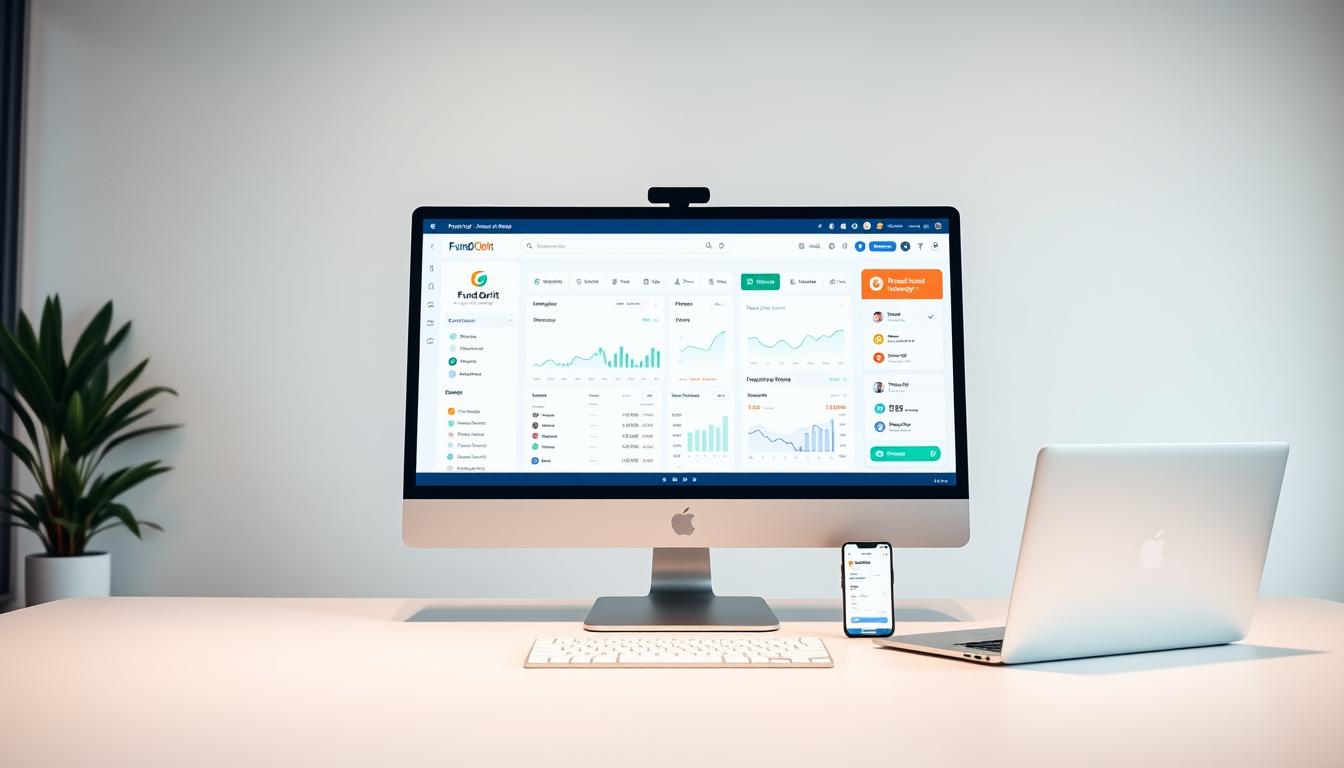Are you curious about investing but think you need a lot of money to get started? Think again! With the rise of top investment apps for beginners, you can now begin your investment journey with as little as $10.
You might be wondering if it’s worth investing such a small amount. The answer is yes! Many reputable brokerages offer free stock-trading platforms that can help you get started. For those interested in learning more about our services or needing assistance with content creation, feel free to reach out to us at raja@cowrit.com for Content Writing, Content Marketing, Digital Marketing, and Social Media Marketing services.
Key Takeaways
- Top investment apps allow you to start investing with minimal capital.
- Many brokerages offer free stock-trading platforms for beginners.
- You can begin your investment journey with as little as $10.
- Reputable brokerages provide a safe and secure environment for investing.
- Investing small amounts can yield significant returns over time.
Understanding the Landscape of Investment Platforms
Online investment platforms have changed how we invest, making it easier than before. Now, you can start investing with little money, thanks to beginner-friendly online investment platforms.
Online investing has grown a lot, with Robinhood, Ally Invest, and Charles Schwab leading the way. They offer free trading and easy-to-use sites. This has made investing open to more people, without high costs.
The Rise of Online Investing
Digital platforms have made investing more welcoming. You can now invest in many things, like stocks and real estate, from home.
These platforms let you manage your money anywhere, using mobile apps. They give you updates and let you make changes easily.
Key Features to Look For
When picking an investment platform, look for a few important things. These include low fees, learning tools, and good customer service. A low-cost investing strategy can really help your money grow.
| Feature | Description | Importance Level |
|---|---|---|
| Low Fees | Minimizes cost, maximizing returns | High |
| Educational Resources | Provides knowledge and investment strategies | Medium |
| Customer Support | Assists with queries and issues | High |
By looking for these features, you can find a beginner-friendly investment platform. It will help you on your investment journey.
What Makes a Platform Ideal for Beginners?

For new investors, the best platform is easy to use and full of learning tools. This mix is key for beginners to feel sure when they start investing.
User-Friendly Interfaces
A user-friendly interface is key for making investment sites open to all. Sites like Robinhood and E-Trade lead the way. They offer intuitive navigation and clear design. This makes it simple for new investors to begin.
Educational Resources and Support
But it’s not just about easy-to-use sites. Educational resources and support are also essential. Fidelity Investments, for example, provides a lot of learning materials. They include webinars, articles, and tutorials to help beginners make smart choices.
These resources cover everything from the basics to advanced strategies. This ensures beginners have the knowledge they need to do well.
If you’re new to investing and have questions, don’t hesitate to ask for help. You can reach out to experts at raja@cowrit.com. They offer services in content writing, content marketing, digital marketing, and social media marketing.
Top Investing Platforms for Beginners

As a beginner investor, you’re looking for a platform that’s easy to use and affordable. There are many great platforms designed for beginners. They offer features to help you start your investment journey.
Robinhood: Commission-Free Trading
Robinhood is a favorite among new investors because of its commission-free trading. You can buy and sell stocks, ETFs, options, and cryptocurrencies without paying a fee. Its user-friendly interface and mobile app make managing your investments easy on the go.
Robinhood is known for its simplicity. You can start investing with just $1. But, remember that while there are no trading fees, other costs like premium services and margin interest might apply.
Betterment: Robo-Advisory for Hands-Off Investing
Betterment is another great choice for beginners. It offers a robo-advisory service that automates investing. By answering a few questions, Betterment creates a diversified portfolio tailored to your needs.
Betterment is perfect for hands-off investing. You don’t need to research stocks or manage your portfolio. It includes tax-loss harvesting and retirement accounts, making it a complete solution for beginners.
When picking between these platforms, compare their key features. Here’s a quick summary:
| Platform | Commission Fees | Minimum Investment | Robo-Advisory |
|---|---|---|---|
| Robinhood | No commission fees | $1 | No |
| Betterment | 0.25% annual fee | $0 | Yes |
Both Robinhood and Betterment are great for beginners. Robinhood is best for those who like to control their investments and enjoy trading. Betterment is ideal for those who prefer a hands-off approach and automated investing.
For more info on these platforms or other services like content marketing, contact us at raja@cowrit.com.
Getting Started with Just $10

You don’t need a lot of money to start investing. $10 is a great starting point. Thanks to micro-investing platforms, it’s easier than ever to begin.
Why Small Investments Matter
Investing small amounts regularly can lead to big gains over time. Warren Buffett said, “Do not save what is left after spending, but spend what is left after saving.” This is key for building wealth.
Small investments help you develop a savings habit. They also make investing less intimidating, even with large sums. Platforms like Acorns and Stash let you start with just a little money, making it accessible to all.
Micro-Investing Explained
Micro-investing means investing small amounts into a variety of investments. It’s great for beginners or those with little money. Apps like this offer features like automatic transfers and low fees.
Some apps even round up your purchases to the nearest dollar and invest the change. This makes investing easy and less likely to be forgotten. As “The stock market is filled with individuals who know the price of everything, but the value of nothing.” Understanding micro-investing can help you make smart choices.
- Start with a small amount, even as low as $5 or $10.
- Choose a micro-investing platform that fits your needs.
- Set up automatic transfers to make investing a habit.
- Monitor your investments and adjust as necessary.
By embracing micro-investing, you’re taking a big step towards a secure financial future. It’s about making progress, not aiming for perfection.
The Importance of Researching Investment Options

Before you start investing, it’s key to look at all your options. As a beginner, the many platforms and tools can feel too much. But, taking time to research can really help your financial path.
According to a financial expert,
“The most important thing for an investor is to understand the investment product and its underlying risks.”
This shows why it’s vital to do your homework before investing.
Different Asset Classes
It’s important to know about different asset classes. Classes like stocks, bonds, real estate, and commodities each have their own traits, benefits, and risks. For example, stocks might offer big returns but can be risky. Bonds are safer but give lower returns.
Key asset classes to consider:
- Stocks: Represent ownership in companies, promising long-term growth.
- Bonds: Debt securities from companies or governments, providing steady income.
- Real Estate: Investing in property, either directly or through REITs, can offer rental income and growth.
- Commodities: Investing in physical goods like gold, oil, or agricultural products.
Risk Management for Beginners
Risk management is a big part of investing. As a beginner, knowing your risk level and how to handle it is key. Diversifying your investments is a smart move. It spreads your money across different areas, lessening the effect of any one investment’s performance.
Diversification strategies include:
- Asset allocation: Spreading investments across different asset classes.
- Dollar-cost averaging: Investing a fixed amount of money at regular intervals, regardless of the market’s performance.
- Regular portfolio rebalancing: Periodically reviewing and adjusting your portfolio to maintain your desired asset allocation.
For more info and beginner investor resources, check out educational sites. They offer insights into investment strategies and risk management. By researching and understanding your options, you can make smart choices that fit your financial goals.
Need Content Writing | Content Marketing | Digital Marketing | Social Media Marketing and More services? Contact us at raja@cowrit.com.
Popular Investment Options for New Investors

Online investing has made it easier for beginners to find investment options. Stocks, ETFs, and real estate crowdfunding are popular choices. They offer a chance to start investing with less money.
Stocks and ETFs
Stocks and ETFs are great for beginners because they are liquid and diverse. Stocks let you own a part of a company. You might get dividends or sell your shares for a profit. ETFs, on the other hand, mix your money with others to invest in many assets.
Real Estate Crowdfunding
Real estate crowdfunding is also popular. It lets you invest in property without managing it yourself. You can join with other investors to fund real estate projects or properties. This can offer a stable return on investment.
If you want to learn more about investing or need help, contact us at raja@cowrit.com. We’re here to assist you.
Understanding Fees and Commissions
As a beginner investor, it’s key to understand fees and commissions. This knowledge helps you get the most from your investments. Different platforms charge in different ways, like commission-free trading or management fees. Knowing these costs helps you make smart choices and save money.
Common Fee Structures Explained
Investment platforms charge fees in various ways. Here are some common ones:
- Commission-free trading: Some platforms let you trade without paying commissions. This is great for those who trade a lot.
- Management fees: Robo-advisors and some platforms charge a fee based on how much you invest.
- Other charges: You might also face fees for things like maintenance, inactivity, or wire transfers.
It’s important to know these fee types. This way, you can pick a platform that fits your investment plan without surprises.
How Fees Impact Returns
Fees and commissions can really affect your investment returns. Even small fee differences can make a big difference over time.
For instance, let’s say you have $10,000 to invest. Platform A charges 0.25% per year, while Platform B charges 1%. Platform A’s fee is $25 a year, and Platform B’s is $100. Over 10 years, the higher fee can really cut into your returns.
So, when choosing a platform, think about the fees and how they’ll affect your returns. Low-cost investing is a smart move for beginners. It helps you keep more of your investment gains.
For more tips on low-cost investing and beginner-friendly platforms, email us at raja@cowrit.com. We’re here to help with resources and support.
Building a Diverse Investment Portfolio
Diversification is key for new investors to reduce risk and increase returns. By spreading investments across different asset classes, you can avoid big losses in any one area. Platforms like Vanguard offer diversified portfolios, and robo-advisors help with asset allocation.
Diversification Strategies
To diversify your portfolio well, consider these strategies:
- Asset Class Diversification: Mix stocks, bonds, and real estate to spread risk.
- Geographic Diversification: Invest in international markets to reduce dependence on any one economy.
- Investment Product Diversification: Use a variety of products like ETFs, mutual funds, and individual stocks.
For example, invest in a total stock market index fund and add international exposure with an international index fund. This mix can be a solid base for your portfolio.
Asset Allocation Basics
Asset allocation means dividing your investments among different categories. The right mix depends on your risk tolerance, investment time frame, and financial goals. A common rule is to subtract your age from 100 (or 110/120 for a more aggressive approach) to find the stock percentage.
For instance, if you’re 30, you might put 70% in stocks and 30% in bonds. As you age, adjust this mix to lower risk.
- Determine your investment goals and risk tolerance.
- Choose an asset allocation model that fits your profile.
- Regularly review and rebalance your portfolio to maintain your target allocation.
By following these steps and using beginner-friendly online investment platforms, you can build a diversified portfolio that meets your financial goals.
For more info on starting to invest and managing your portfolio, contact us at raja@cowrit.com. We offer content writing, content marketing, digital marketing, and social media marketing services.
Importance of Setting Financial Goals
Setting financial goals helps you stay focused on your investment path. It ensures you’re moving towards your desired outcomes. As a beginner investor, clear objectives can significantly impact your investment decisions and success.
Financial goals vary among investors. They usually fall into two categories: short-term and long-term goals. Knowing the difference helps you make better investment decisions.
Short-Term vs. Long-Term Goals
Short-term goals are achieved in a few years. They might include saving for a house, car, or vacation. These goals need liquid investments to be available when needed.
Long-term goals, like retirement or funding a child’s education, take decades. They allow for more aggressive investment strategies.
It’s essential to balance short-term and long-term goals. For example, saving for retirement is important, but so is saving for a house. Diversifying investments across different asset classes helps achieve both.
“The biggest investment risk is not taking any risk… In a world that’s changing really quickly, the only strategy that is guaranteed to fail is not taking risks.” – Malcolm Gladwell (though not directly quoted, the essence is maintained)
Malcolm Gladwell’s original quote isn’t directly related to our topic. A more fitting quote is: “Setting financial goals is the first step in investing. It gives you a target to work towards.” This highlights the importance of clear financial objectives.
Tracking Progress Over Time
Tracking your progress is key once you’ve set financial goals. Many beginner-friendly investment platforms offer tools to monitor investments and adjust strategies as needed.
Regularly reviewing your portfolio helps you:
- Check if you’re on track to meet your financial goals
- Adjust your investment strategy if needed
- Rebalance your portfolio for optimal asset allocation
By staying informed and proactive, you can maximize your investments. This moves you closer to achieving your financial objectives. For more beginner investor resources, explore top investment apps for beginners with educational content and user-friendly interfaces.
Need Content Writing | Content Marketing | Digital Marketing | Social Media Marketing and More services? Contact us at raja@cowrit.com.
Navigating Mobile Investment Apps
Mobile investment apps have changed how we invest. They let you manage your portfolio anywhere, anytime. These apps have features for beginners, like real-time updates and educational tools.
Best Features for On-the-Go Investing
When picking a mobile investment app, look for certain features. These include:
- Real-time Updates and Alerts: Get news on market changes and adjust your portfolio.
- User-Friendly Interface: A simple design makes managing your investments easier.
- Educational Resources: Many apps have tutorials, guides, and news to help you decide.
Here’s a comparison of some popular mobile investment apps:
| App Name | Commission Fees | Minimum Investment | Educational Resources |
|---|---|---|---|
| Robinhood | $0 | $0 | Yes |
| Betterment | 0.25% | $0 | Yes |
| Fidelity | $0 (for certain investments) | $0 | Yes |
Security Considerations for Mobile Apps
Mobile investment apps are convenient but security is key. Look for apps with strong security features, such as:
- Two-Factor Authentication: Adds extra security to your account.
- Encryption: Keeps your personal and financial data safe.
- Regular Updates: Keeps the app secure and up-to-date with regulations.
For more info on starting to invest, contact us at raja@cowrit.com. We offer content writing and digital marketing services.
Community and Support for New Investors
Starting your investment journey as a beginner is easier with a supportive community. Being part of a community gives you the guidance and encouragement you need. It helps you make informed decisions.
Online Forums and Groups
Online forums and groups are great for new investors. Sites like Reddit’s r/investing and r/finance have active communities. Here, you can ask questions, share experiences, and learn from others.
Benefits of Online Communities:
- Access to a wealth of shared knowledge and experiences
- Opportunities to ask questions and receive timely advice
- Support from a community that understands the challenges of investing
Educational Webinars and Resources
Educational webinars and resources are key for new investors. Many platforms, like E-Trade, offer webinars, tutorials, and guides. These help you learn the basics and advanced strategies.
“The key to successful investing is not about being right all the time, but about being right when it counts.” –
Here’s a comparison of some popular educational resources:
| Platform | Webinars | Tutorials | Guides |
|---|---|---|---|
| E-Trade | Yes | Yes | Yes |
| Robinhood | No | Yes | Yes |
| Betterment | Yes | Yes | No |
For more information or to inquire about our content writing and digital marketing services, please contact us at raja@cowrit.com.
Staying Informed About Market Trends
Starting your investment journey is exciting. It’s key to keep up with market trends. Use financial news and tools from top apps to stay informed.
Reliable Financial News Sources
Reading from trusted sources like Bloomberg, CNBC, and The Wall Street Journal is helpful. They share insights on market changes and economic shifts. This info is vital for your investments.
Utilizing Market Analysis Tools
Beginner-friendly platforms offer tools for market analysis. These tools help you track trends and adjust your investments. They make decision-making easier.
Stay informed and use these tools to invest wisely. For more on investment services, contact us at raja@cowrit.com.


